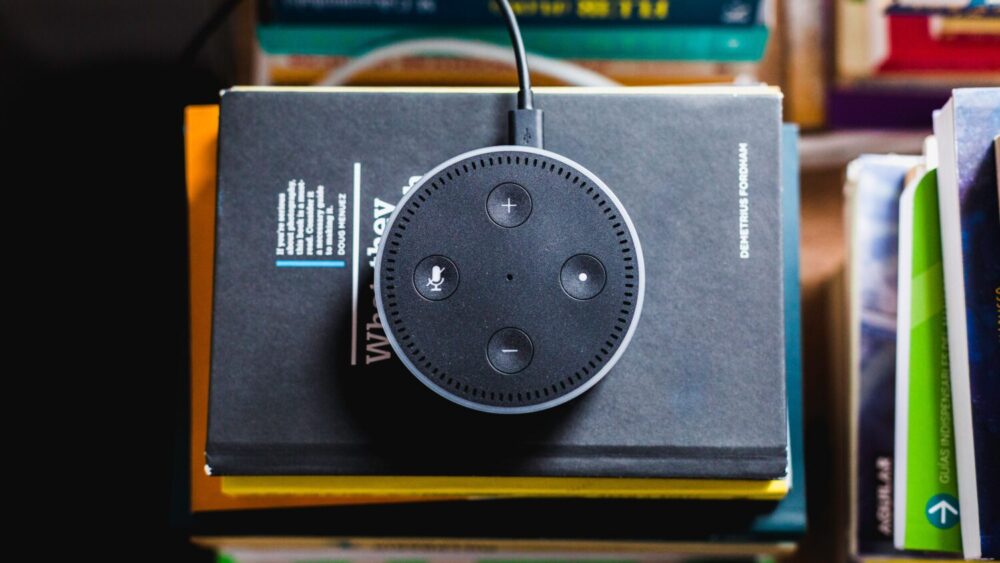There are many tools to help seniors and people with vision impairments. Each of them makes life easier and more accessible in some way. One of the most convenient is a virtual assistant like Amazon’s Alexa. Here are some of the skills deemed most valuable for those with vision impairments.
This post may contain affiliate links, which means we may receive a commission if you click a link and purchase something that we have recommended. This commission comes at no additional cost to you, but will help us keep this site up and running and ad-free! Thank you for all the support. You’re under no obligation to purchase anything and should only do so if the product will suit your needs.
Reading
If you’re dealing with blindness, low vision, vision impairments, learning disabilities, or print disabilities, these Amazon Skills are very helpful. Try these commands:
- Alexa, Read from Kindle – this works even if you don’t have the audio version of a book, meaning many more titles are now accessible! Alexa will start with the most recent page and continue reading to you until you ask her to stop. You can also ask her to read from the start of the chapter. User testing shows that she pronounces words correctly and is easy to understand. The one key is that the book will need to support text-to-speech. That’s usually not a problem, especially for the most common genres and titles.
- Alexa, Start Bedtime Stories – this is a fun way to discover new children’s books! While targeted at children, it’s fun for anyone who’d like to listen to a soothing voice while drifting off to sleep.
- Alexa, Play My Flash Briefing – Reading the news online can be distracting with flashing ads, gifs, and other visual stimuli that make it hard for a person with visual impairments to focus on the words. With this command, Alexa delivers a quick, concise, and easily understood news briefing. It usually lasts from two to ten minutes, depending on the number of sources.
- Alexa, Read (Title) on Audible – if you’re an Audible user, you know that the books are read by professionals, but the titles can be more limited. When you deliver this command, Alexa will access your Audible library and begin the selected title where you left off. You can also fast forward, rewind, and adjust the volume.
- Alexa, Read Me a Poem – This one is a bit different in that Alexa doesn’t do the actual reading. Instead, she randomly selects a classic poem and sends it to the Alexa app, where you can then open it with a web browser of your choice and read it with assistive technology.
- Alex, What’s the Definition of (Word) – With her built-in dictionary, Alexa can tell you the meaning of any word. She does get a bit confused with homonyms and homophones sometimes, though! You can also ask her how to spell words, which is very helpful for students.
- Alexa, Wikipedia (Topic) – If it’s in Wikipedia, Alexa can look it up and tell you more. Whether it’s a favorite band or a complex chemical formula, Alexa reads the articles in a smooth, easily understood way.
6 Amazon Alexa Features You Don’t Need


Identification
People with vision challenges may not be able to identify something that’s on a counter or tabletop. This can be confusing and possibly dangerous. Using an Echo show and the question “Alexa, what am I holding?” solves this problem. This helps foster independence and saves time because users don’t have to find another person to ask.
Entertainment
Want to listen to your favorite song or discover new musical talent? Alexa can help with that! You will need an Amazon Prime membership, which includes a lot of free books, music, and videos, though the membership itself is a paid program. Check out these commands:
- Alexa, Play My Music – This starts your playlist
- Alexa, Play (Song/Band) – You can request a specific band, song, etc. if there’s something you particularly want to hear.

Information
Want to know the weather, the day/time, the phone number to a local business, or basically anything else? Ask Alexa! The default search engine is Bing, and it doesn’t appear you can change that at this time. This can be a bit problematic, as most information is on Google. If Alexa can’t find it and you have a Google Home device, ask there. Chances are, you’ll find what you’re looking for!
You can also make phone calls and texts, set up task reminders and alarms, manage your calendar and to-do lists, keep your grocery list, send and receive emails, and if connected to other devices in your home, manage those as well. Some of these skills are device-specific, so be sure you do your research to find the one that’s right for you.
On the Go
With Echo Buds, you can take your Alexa assistant with you! By using a smart WiFi switch controlled on your phone, this means you may be able to do things like open doors through the magic of your voice. Adaptations to doors etc. may be necessary for this to work. However, all the other skills we mentioned will work on the go, unless a specific device is required.
Do you have other Alexa commands you love that are valuable for people with visual impairments? Let us know so we can add them to the list!









